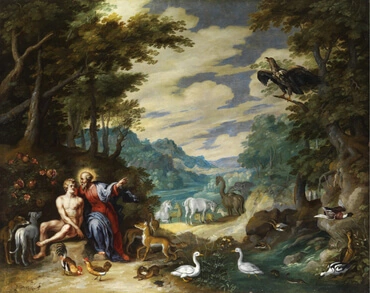1
Or Adamo conobbe Eva sua moglie, la quale concepì e partorì Caino, e disse: "Ho acquistato un uomo, con l’aiuto dell’Eterno".
2
Poi partorì ancora Abele, fratello di lui. E Abele fu pastore di pecore; e Caino, lavoratore della terra.
3
E avvenne, di li a qualche tempo, che Caino fece un offerta di frutti della terra all’Eterno;
4
e Abele offerse anch’egli dei primogeniti del suo gregge e del loro grasso. E l’Eterno guardò con favore Abele e la sua offerta,
5
ma non guardò con favore Caino e l’offerta sua. E Caino ne fu molto irritato, e il suo viso ne fu abbattuto.
6
E l’Eterno disse a Caino: "Perché sei tu irritato? e perché hai il volto abbattuto?
7
Se fai bene non rialzerai tu il volto? ma, se fai male, il peccato sta spiandoti alla porta, e i suoi desideri son vòlti a te; ma tu lo devi dominare!"
8
E Caino disse ad Abele suo fratello: "Usciamo fuori ai campi!" E avvenne che, quando furono nei campi, Caino si levò contro Abele suo fratello, e l’uccise.
9
E l’Eterno disse a Caino: "Dov’è Abele tuo fratello?" Ed egli rispose: "Non lo so; sono io forse il guardiano di mio fratello?"
10
E l’Eterno disse: "Che hai tu fatto? la voce del sangue di tuo fratello grida a me dalla terra.
11
E ora tu sarai maledetto, condannato ad errar lungi dalla terra che ha aperto la sua bocca per ricevere il sangue del tuo fratello dalla tua mano.
12
Quando coltiverai il suolo, esso non ti darà più i suoi prodotti, e tu sarai vagabondo e fuggiasco sulla terra".
13
E Caino disse all’Eterno: "Il mio castigo è troppo grande perch’io lo possa sopportare.
14
Ecco, tu mi scacci oggi dalla faccia di questo suolo, ed io sarò nascosto dal tuo cospetto, e sarò vagabondo e fuggiasco per la terra; e avverrà che chiunque mi troverà mi ucciderà".
15
E l’Eterno gli disse: "Perciò, chiunque ucciderà Caino, sarà punito sette volte più di lui". E l’Eterno mise un segno su Caino, affinché nessuno, trovandolo, l’uccidesse.
16
E Caino si partì dal cospetto dell’Eterno e dimorò nel paese di Nod, ad oriente di Eden.
17
E Caino conobbe la sua moglie, la quale concepì e partorì Enoc. Poi si mise a edificare una città, a cui diede il nome di Enoc, dal nome del suo figliuolo.
18
E ad Enoc nacque Irad; Irad generò Mehujael; Mehujael generò Methushael, e Methushael generò Lamec.
19
E Lamec prese due mogli: il nome dell’una era Ada, e il nome dell’altra, Zilla.
20
E Ada partorì Jabal, che fu il padre di quelli che abitano sotto le tende presso i greggi.
21
E il nome del suo fratello era Jubal, che fu il padre di tutti quelli che suonano la cetra ed il flauto.
22
E Zilla partorì anch’essa Tubal-cain, l’artefice d’ogni sorta di strumenti di rame e di ferro, e la sorella di Tubal-cain fu Naama.
23
E Lamec disse alle sue mogli: "Ada e Zilla, ascoltate la mia voce; mogli di Lamec, porgete orecchio ai mio dire! Sì, io ho ucciso un uomo perché m’ha ferito, e un giovine perché m’ha contuso.
24
Se Caino sarà vendicato sette volte, Lamec lo sarà settantasette volte".
25
E Adamo conobbe ancora la sua moglie, ed essa partorì un figliuolo, a cui pose nome Seth, "perché" ella disse, "Iddio m’ha dato un altro figliuolo al posto d’Abele, che Caino ha ucciso".
26
E anche a Seth nacque un figliuolo, a cui pose nome Enosh. Allora si cominciò a invocare il nome dell’Eterno.







